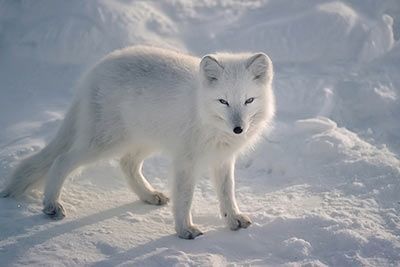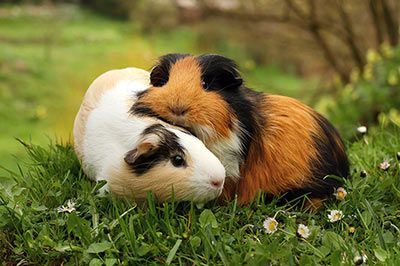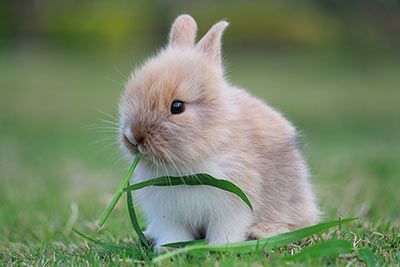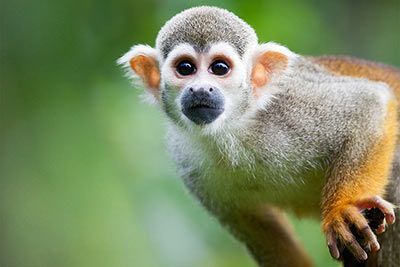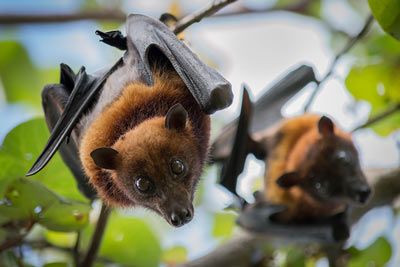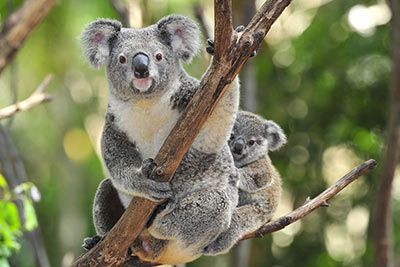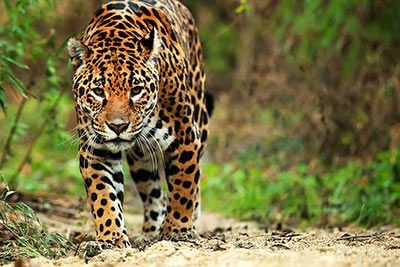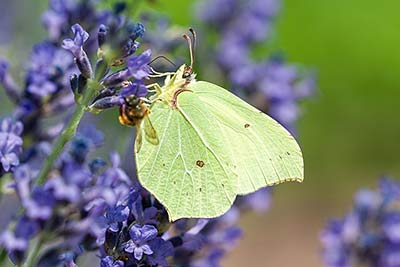Wildebeest
Blue Wildebeest Facts
| Size | 43-60 inches (115-150 cm) (shoulder height) |
| Speed | 43-50 mph (70-80 km/h) |
| Weight | 308-595 pounds (140-270 kg) |
| Lifespan | 20 years |
| Food | Grass |
| Predators | Lions, cheetahs, hyenas, crocodiles |
| Habitat | South and East Africa |
| Order | Even-toed ungulates |
| Family | Bovids |
| Scientific name | Connochaetes |
| Characteristics | Ungulate that migrates in large herds |
Main Characteristics
Wildebeest are hoofed animals that migrate through Africa in large herds. They are among the largest and heaviest antelopes in the world. Their most striking features are their curved horns, which resemble those of goats. Both male and female animals sport them. The best known species is the blue wildebeest.
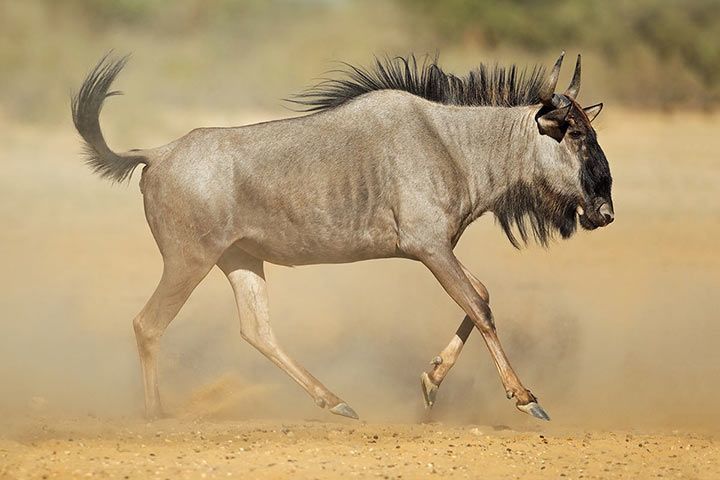
Species
There are two species: the blue wildebeest and the black wildebeest (with five subspecies). The best known is the blue wildebeest, but the most common is the black wildebeest.
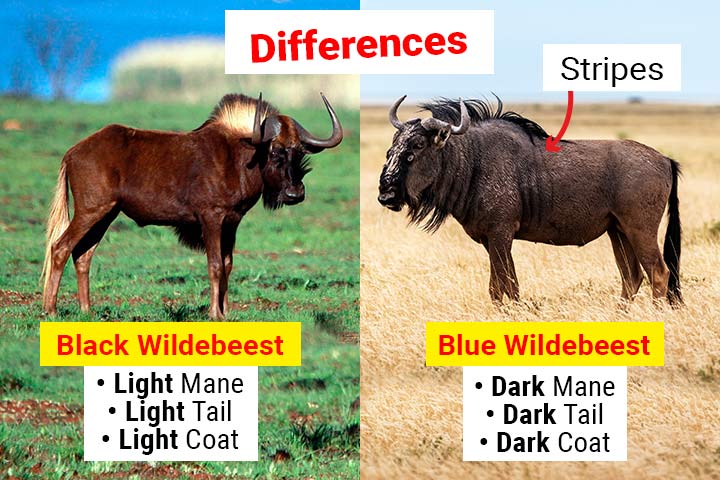
Name
The name wildebeest probably comes from the language of the Khoikhoi, an indigenous people of Africa. They call the animal “t’gnu”. The English word “wildebeest” is Dutch and means “wild animal”.
Distribution and Habitat
Wildebeest live in Africa: South Africa, Angola, Namibia, Botswana, Zimbabwe, Zambia, Tanzania and Kenya. Their preferred habitat is savannas.
Life Style
Wildebeest are diurnal and are most active in the morning and afternoon. They spend most of their time looking for food and grazing. When it is dark or particularly hot, they rest. Wildebeest are famous for migrating in large herds. They travel across Africa to find fresh, lush grass. Their migrations depend on the weather. They basically follow the rain – because it makes the grass grow. The animals used to be able to migrate unhindered. Today that is hardly possible anymore. Farmers have enclosed large areas with fences. As a result, the animals are unable to move freely in many places. places.
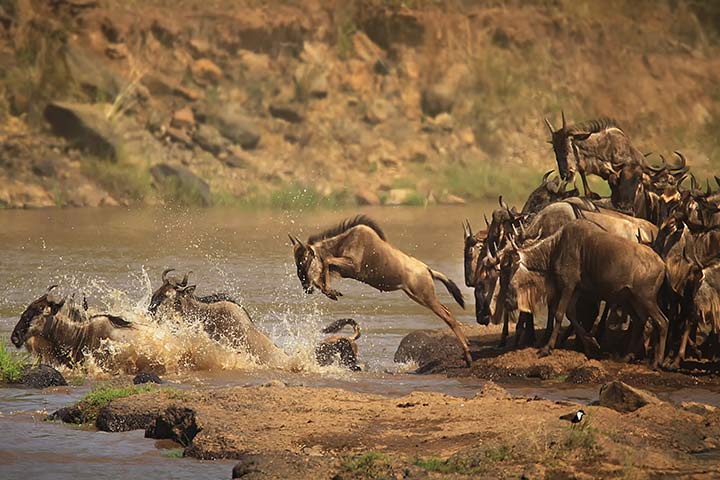
Anatomy and Appearance
Appearance
Wildebeest possess a sturdy and compact body, with a notably large and rectangular head. Their mane is abundant and lengthy, and it is not uncommon for them to sport a beard-like feature on their neck.
Size and Weight
The blue wildebeest is the largest wildebeest. Its shoulder height is 43-60 inches (115-150 cm), its body length is 67-98 inches (170-250 cm) long and its weight is 308-595 pounds (140-270 kg). The males are slightly larger and heavier than the females.
Tail and Mane
One of the most striking features is the tail. It grows 24-40 inches (60-100 cm) long. The tail and mane of blue wildebeest are black. The black wildebeest has a light brown mane with black tips and a cream to light brown tail.
Stripes
The blue wildebeest has got vertical stripes on its coat from the neck down the shoulder to its back.
Horns
Male and female wildebeests both possess horns, with the bulls having horns that are twice the size of the cows. The longest horn measured so far was 83 cm long.
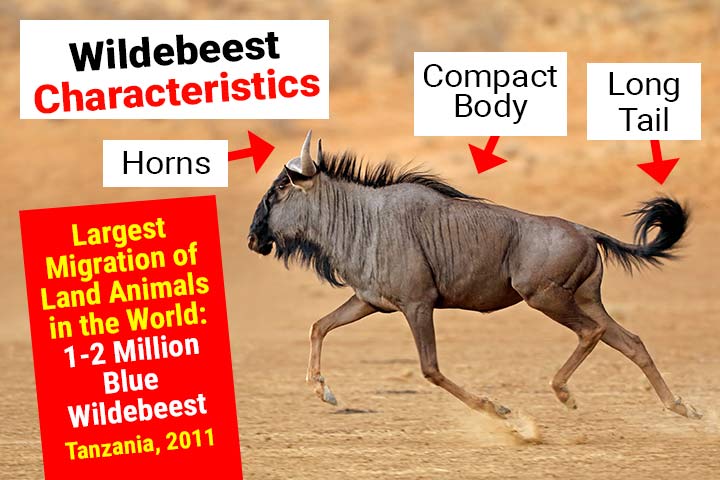
Diet
Food Needs
Wildebeest are herbivores. They feed on grass. However, they are very picky and will only eat it when it is fresh. That's the reason they instinctively navigate towards regions that have experienced recent rainfall. They hope to find lush, newly grown grass there.
Water Needs
Wildebeest don't migrate in the cool evening hours, but during the day, when it can be up to 100 degrees Fahrenheit (38 degrees Celsius). Luckily, they can go without water for up to five days.
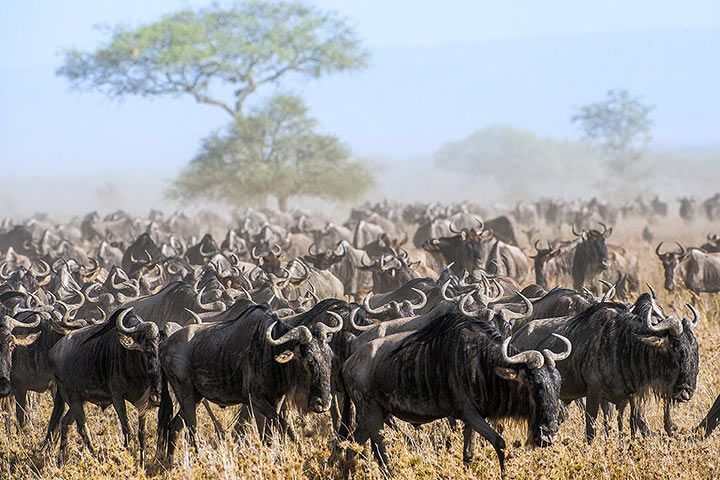
Migration
Why Do Wildebeest Migrate?
Wildebeest migrate to find fresh grass and water. Whenever a rainy season ends, the animals move on - to an area with more rain. There are wildebeest species that constantly move on, but also species that only migrate for short distances and tend to stay nearby.
Why Do Wildebeest and Zebras Migrate Together?
Wildebeest and zebras frequently travel in groups during migration. It's a major benefit for both animal species as they can alert one another when predators are getting closer. The zebra groups take the lead, munching on the tall, nutrient-deficient grass. Following behind, the wildebeest graze on medium-high, nutrient-packed grass.
How Many Wildebeest Migrate?
In 2011, wildebeest were counted during their migration in Tanzania: there were one to two million animals, making them the largest migratory herd in the world. The record is in the Guinness Book of Records.
How Far Do Wildebeest Migrate?
Every year, gnus migrate long distances. In the Serengeti, a savanna northeast of Tanzania, it is 500-1,000 miles (800-1,900 km). The migration begins around January to March in the southeast of the Serengeti – just when the calves are born. They then move across grasslands towards Lake Victoria. They continue their migration through the open forests and then cross the Mara River. In the end, they turn around and head south again.
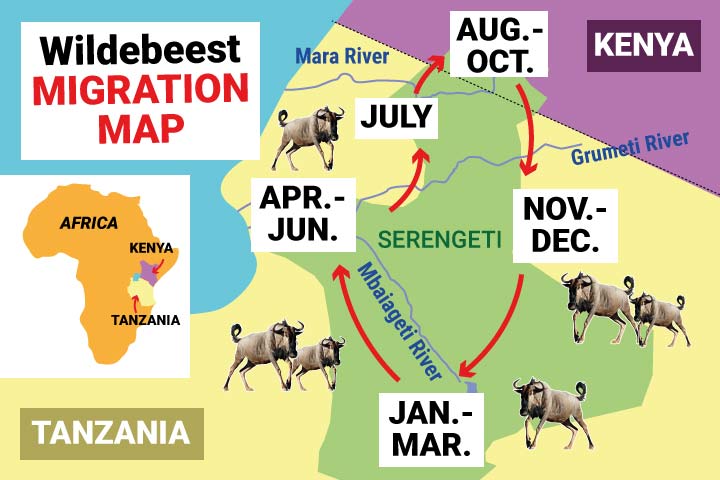
Living in Herds
What Is the Size of a Wildebeest Herd?
Wildebeest form herds of 10-60 animals. During their migrations, many herds come together and form a massive group of one to two million animals.
Why Do Wildebeest Form Large Herds?
Wildebeest are a delicious meal for hyenas, lions, leopards and crocodiles. Living in a herd they can defend themselves better. This increases their chances of survival. For example, if they have to cross a river, they all swim across together. It is more difficult for crocodiles to attack an entire group than to capture a single animal.
Defense
How Do Wildebeest Defend Themselves?
When predators approach and the wildebeest can't escape, they stand close together. The weaker animals are surrounded by a protective circle of the strongest animals, who face outward to keep watch over everything. If they're being attacked, they defend themselves very fiercely. They kick with their hooves or try to chase away predators with their horns.
Are Wildebeest Aggressive?
Wildebeest look very aggressive. But they are very good-natured. Nevertheless, they can be wild and unpredictable - namely during the mating season. The males engage in battles with their competitors in order to increase their chances of attracting a mate. They display aggressive behaviors such as bucking, snorting, stomping their hooves, or ramming their heads into each other.
Do Wildebeest Attack People?
It is very rare for a wildebeest to attack a human. But they can become dangerous if they feel threatened. For example, if they are locked in a paddock and a human enters „their territory“.
Can a Wildebeest Kill a Lion?
Wildebeest are incredibly powerful creatures that can seriously injure a lion with their curved horns. After impaling the attacker, they toss it around. The lion may escape with bruises, but the wound can be fatal if it becomes infected with bacteria. Even if multiple lions manage to overpower a lone wildebeest, it can manage to break free and scare off the predators with the help of its strong muscles. In the end, the wildebeest is weakened from the fight and rather opts to rejoin its herd than persist in pursuing the lion.
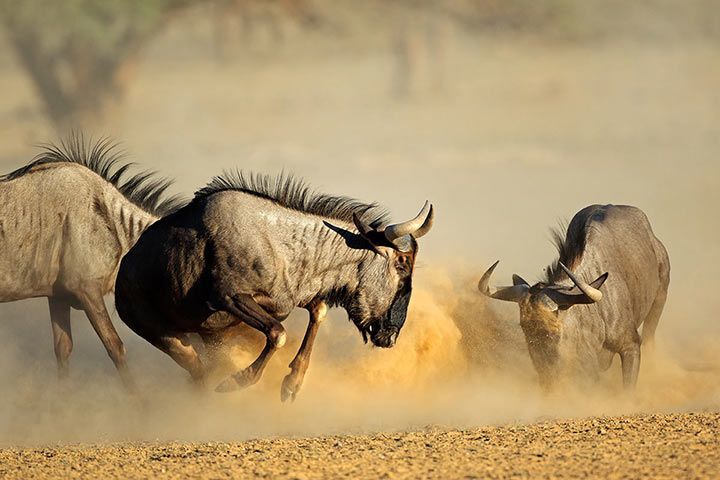
Senses and Abilities
Speed
Wildebeest are among the top 10 fastest land animals. They can run at a speed of 50 mph (80 km/h).
Senses
Do wildebeest have a good sense of smell? Yes. They're like professional weather forecasters, as they can detect approaching thunderstorms from long distances. They're also able to perceive approaching rain with their excellent sense of hearing. Cloud formations may also serve as a guide for direction because storm clouds are often visible from great distances.
Life Expectancy
Wildebeest have a potential lifespan of 40 years, but in their natural habitat, they typically only survive up to 20 years. Interestingly, the longest-living wildebeest in captivity reached over 24 years of age.
Enemies and Threats
Natural Enemies
Healthy, adult wildebeest are very strong and can defend themselves very well. They hardly have any enemies. Only single, young, weak or old animals are preyed upon by lions, leopards, hyenas, wild dogs and crocodiles.
People
The biggest threat to the wildebeest is humans. The animals are hunted for their meat and skin (= leather). Fly swatters are made from their tails. However, that's not the only problem they're facing. They also suffer from the loss of their habitat. Farmers are putting up more and more protective fences for livestock farming, thus fragmenting the wildebeest's habitat. They block their path so that they can no longer reach watering holes in time. As they move in large herds, many animals can die within a short period of time.
How Many Wildebeest Are Left?
There are around 1.5 million wildebeest in total. The most common wildebeest is the white-bearded wildebeest with around 1.3 million animals. It isn't considered endangered. Things are different with the black wildebeest. It almost became extinct due to hunting at the end of the 19th century. There were only 600 animals of this species left. Luckily they found refuge in wildlife parks and were able to multiply again to 20,000 animals.
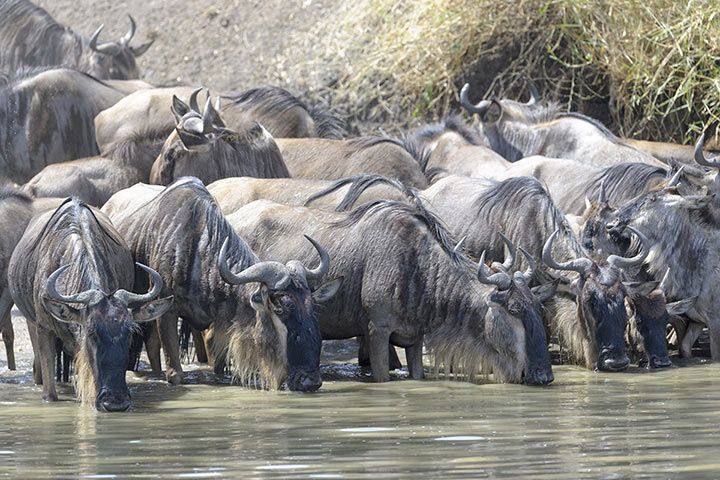
Importance for the Ecosystem
Fertilizer
Wildebeest fertilize the soil through their droppings.
Wildebeest Save the Serengeti
Wildebeest are extremely important to the ecosystem. In the middle of the 20th century, they even saved the Serengeti. At this time, there were only 300,000 wildebeest left there. As a result, the grass stopped being eaten and instead grew very tall. At the end of the rainy season it became very dry and even tiniest sparks were enough to ignite massive bushfires. The ecosystem got completely out of balance and the Serengeti was responsible for a large amount of harmful greenhouse gases. Fortunately, the wildebeests were able to reproduce again. As a result, the Serengeti recovered.
Reproduction
Wildebeest have a gestation period of around nine months. Around half a million calves are born in the Serengeti from February to March, coinciding with the start of the rainy season, when the grass is fresh and lush. Usually, ungulates leave their herd to give birth and remain alone with their calf for a few days. Things are different with the wildebeest. To ensure their safety during birth, the mothers position themselves in the center of the herd, where they can be protected by the other animals. The calves start eating grass after just 10 days, but they will continue to nurse for a few months. After leaving their mother, the young animals come together to form their own herd.
Fun Facts
Antelope Family
When thinking of antelopes, you probably think of slender gazelles. But, surprise: the large, powerful wildebeest is also an antelope. In fact, antelope isn't actually an official animal family. It is a collective name for wild hoofed animals with horns.
The Wildebeest Is Related To:
- Hartebeest
- Bonteboks
Animals in the Same Biome:
Related Articles:













